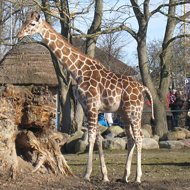
Zoo said giraffe was of no value to breeding progamme
The captive bolt gun killing of a healthy young giraffe in a Denmark zoo has led an international wildlife charity to demand change.
The Born Free Foundation (BFF) said Marius, an 18-month-old giraffe at Copenhagen Zoo, was killed and fed to the lions after zoo officials deemed he was of no value to its breeding programme.
The much publicise killing of Marius, has prompted the BFF to call for a change in the European Association of Zoos and Aquaria (EAZA) policies regarding euthanasia.
The BFF argues that euthanasia should only be employed to prevent suffering of an individual animal and after all other options, such as relocation of the animal, have been exhausted.
Will Travers OBE, president of the BFF said: “Born Free, and the majority of the right-thinking world, is appalled at the killing of Marius the giraffe. The slaughter of healthy animals by zoos must stop.”
A spokesman for the BFF said the Zoo took the decision to kill Marius after determining that he was closely related to the other giraffes in European zoos and therefore of no value to their breeding programme.
It comes at the same time that Longleat Safari Park killed six of their lions - one on welfare grounds as a result of injuries from a fight in their enclosure; and five others due to suspected neurological problems from inbreeding.
Virginia McKenna OBE, founder of the BFF said: “I am appalled by the decision to kill this poor, healthy young giraffe.
"This is an outrage that highlights the urgent need to look more closely at all zoos and the welfare of animals forced to survive in zoo enclosures.
"Now is the time for people throughout Europe to demand that no more captive wild animals suffer the same tragic fate.”
Meanwhile research by the BFF has shown that the majority of species kept in zoos are not threatened with extinction in the wild.
Mr Travers said: “Zoos claim that their breeding programmes are contributing to conservation – I say: show me the evidence.
If keeping and breeding threatened species are priority for zoos, why then do they keep mostly common species?”
Visit www.bornfree.org.uk/zoocheck
Image by Einarspetz



 The Greyhound Board of Great Britain has published new vaccination guidance, with all greyhounds registered from 1 January, 2027 required to have the L4 leptospirosis vaccination, rather than L2.
The Greyhound Board of Great Britain has published new vaccination guidance, with all greyhounds registered from 1 January, 2027 required to have the L4 leptospirosis vaccination, rather than L2.